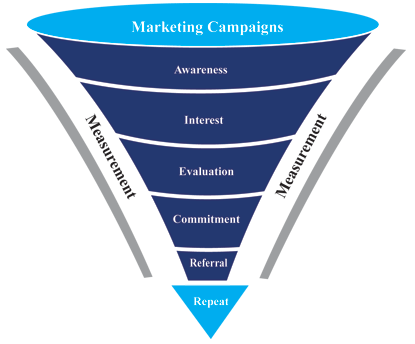
I agree that this is a rather “unpleasant-sounding†term. It conjures the image of treating your fans like meat going through a grinder.
But the “funnel†metaphor is nevertheless quite accurate, when you consider the funnel shape.
At the top, broadest part, you have your general visitors. Then, as the funnel narrows down, you have your prospects who opted in to your list. Next, you have sales. After that, after-sales. And so on.
[emember_protected for=4-5]
So, a “sales funnel†is an engagement PROCESS that you envision for your customers. You can (and perhaps should) hire experts to help you design your first sales funnel, or you can try to copy an existing one – but that’s not as easy as it seems, because most funnels have “hidden†elements in them which you’ll be hard-put to discover unless you go through ALL the options personally.
Whether you build your own sales funnel or have one done for you, you still need to understand how it works and what are the possible steps you need to consider.
A “sales funnel†is like a decision tree.
- Would you like “this?â€If Yes, sign up then deliver something you promised
- Yes – go to page A
- No – go to page B – then end
- Would you also like X?
- Yes – go to page C
- No – go to exit page, then retry some days later
- If Yes, then ask if they also want Y?
- … and so it goes. That’s a basic funnel.
 The simplest form is a “no funnel†option, where a visitor enters your sales page and either buys your product or leaves. If he buys, he’s directed to a payment page (often pre-made for you by your payment processor), and once the payment is made, he’s out of your hands. This is a common model for many beginner affiliate marketers. It’s very easy to set up – but the disadvantage is that you do not know WHO bought from you, nor are you able to sell something else to them.
The simplest form is a “no funnel†option, where a visitor enters your sales page and either buys your product or leaves. If he buys, he’s directed to a payment page (often pre-made for you by your payment processor), and once the payment is made, he’s out of your hands. This is a common model for many beginner affiliate marketers. It’s very easy to set up – but the disadvantage is that you do not know WHO bought from you, nor are you able to sell something else to them.
A slightly more advanced funnel is when you’re offering an affiliate product, but rather than sending the prospect to the product page, you FIRST interject yourself with a “free gift†offer. The purpose of this freebie is to collect this person’s contact details. So, for example, “enter your email address and get this free bookâ€, after which they get sent to the sales page proper.
But funnels can get a lot more complex than that. In fact, some professional marketers are convinced that “THE Secret†to successful online marketing is how well a funnel is constructed and the way people are coaxed into purchasing “upsells.â€
A good funnel works like a friendly sales assistant and customer care rep rolled into one. It contains follow-up messages, different exit pages which depend on the visitor’s actions, and so on. And everything works on “autopilotâ€.
You may now want to pause reading this book and check out the enclosed Funnel Mastery course for all the hands-on details.
[/emember_protected]
 |
 |
 |
| Book 3 – Chapter 41Fan Relationships |
Course Overview | Book 3 – Chapter 43Landing Pages |
Book 3: 1, 2, 3, 4, 5, 6, 7, 8, 9, 10, 11, 12, 13, 14, 15, , 17, 18, 19, 20, 21, 22, 23, 24, 25, 26, 27, 28, 29, 30, 31, 32, 33, 34, 35, 36, 37, 38, 39, 40, 41, 42, 43, 44, 45, 46, 47, 48, 49, 50, 51, 52, 53, 54, 55, 56, 57, 58, 59, Overview
Bonuses: templ, lib, tips, kwds, models Link Res: aff, class, cpa, cpv, cpc, write, mob, outs, rss, soc, traff, var, exch, srcs, vid Sub-courses: sens adw, aff, ar, bkm, cpy, cp, fb, fun, goo, lst, loc, mem, opt paid, ppal, sbox, prod, seo, opt, socn, vidm, host, wp, lnch

